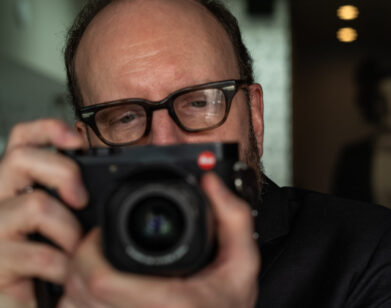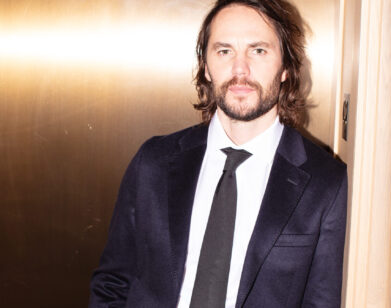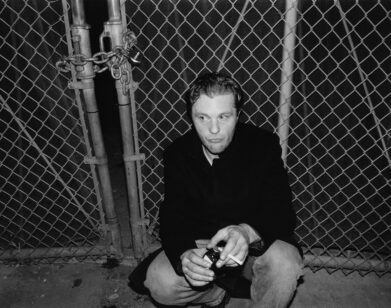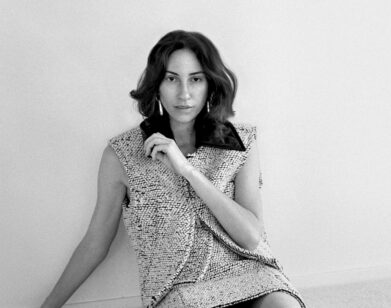The Features of Rosemarie DeWitt
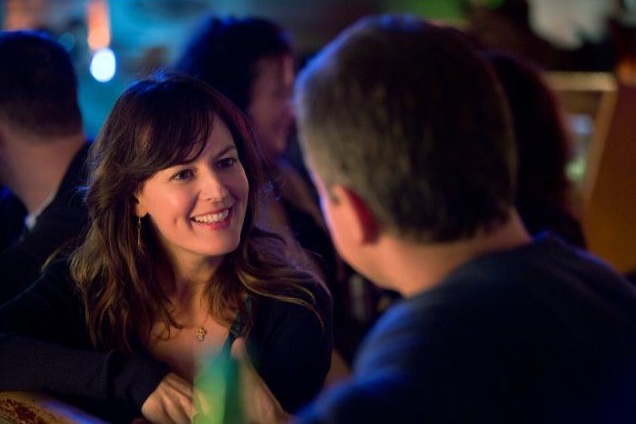
ABOVE: ROSEMARIE DEWITT (LEFT) WITH MATT DAMON IN PROMISED LAND. IMAGE COURTESY OF SCOTT GREEN/FOCUS FEATURES
Rosemarie DeWitt is probably best known for her roles in Rachel Getting Married and TV’s The United States of Tara. What is lesser known is that she’s a talented theater actress and an activist dedicated to ending human sex trafficking. This year alone has found her in a handful of wildly different films—The Watch, The Odd Life of Timothy Green, Your Sister’s Sister—and Gus Van Sant’s upcoming Promised Land, which places her squarely in the middle of a slew of talented actors, including Matt Damon and John Krasinski, who also penned the film. DeWitt plays the love interest of protagonist Steve Butler, played by Damon, who’s come to her small town to convince its residents to allow his energy corporation to drill on their property—a tougher job than he initially expects.
We recently caught up with DeWitt in Los Angeles, where she had plenty to say about acting, aging, and finding balance in the middle of everything as she prepares for her upcoming role as a litigator on HBO’s The Newsroom.
AMANDA MAE MEYNCKE: Your character in Promised Land, Alice, is not a desperate person, especially in her relationships with men. She’s not waiting around for Steve Butler; she’s living her life. How did you work on being a strong supporting character in the story?
ROSEMARIE DEWITT: It helps to really know what our hero’s journey is, who you are to him, where you’re needed in the story. I think she’s spent some time sort of holding space for him, to become who he’s trying to become. I really appreciated the times he said to her “I’m not a bad guy,” and that he cares what she thinks. Even though his actions weren’t exactly giving her a lot of encouragement, I think she was encouraged by how much he thought of her, how much he valued her opinion. That he thinks, “She’s someone I want to think well of me.”
MEYNCKE: I think it can be dangerous to love the potential in people; you often end up being disappointed if you fall in love with anything other than the reality.
DEWITT: I think Jung said, you know, I’m gonna paraphrase it badly, but, so much of what we fall in love with in other people is a potential in us that’s ready to be realized. We’re projecting onto them this amazing thing, but really it’s us, and we’re very close to integrating it and claiming it. If we do claim it, then we can just love somebody for who they are with all their flaws, but if we don’t take that projection back, then we keep wanting them to have that. [pauses] Then you just realize we’re all screwed, that’s how it works. [laughs]
MEYNCKE: How do you find balance in your own life?
DEWITT: It’s hard. On weeks like this, where we’re doing a lot of press, I find that my touchstones go out the window, the routines, the things that you do to keep you grounded. Then when I’m out of work I have too much time. The trick is not to get lost surfing the Internet.
MEYNCKE: “It’s 5 pm already?”
DEWITT: “Where did the day go!” [laughs] I need that block on my computer.
MEYNCKE: Do you have things to keep you busy?
DEWITT: I’m always studying something or trying to learn something, keep myself creatively occupied, because I think that energy can get kind of destructive if it doesn’t have somewhere to go. I started a writing class, not in service of writing a script or writing anything [specific]. I’ve just really been enjoying that, and oddly the group, not by design, but it just happened to be all women, and there were three women who gave birth this fall while we were all in class, and there’s just something really great about getting to know these women through their stories and what they’re writing about. That was keeping me busy, I took some meditation classes, that was fun. I learned to cook a little bit…
MEYNCKE: I wish I had more time to do that.
DEWITT: Yeah, you’re so young, though. When it becomes an imperative, when you’re like “I cannot go to Real Food Daily again this week,” then, you know.
MEYNCKE: People, in Hollywood especially, have such a complicated relationship to aging. Are there certain roles you’re looking forward to aging into?
DEWITT: It’s interesting, you hear about it a lot. I get mad at my girlfriends when they say things about their neck or something, “My neck is a disaster,” and I’m like, “Come on, you don’t even believe that.” You’re taking that from the outside world, you know? You look amazing, you’re beautiful, you’re 40, you’re in the prime of your life. I’m not interested in fighting it at all. I don’t think anyone else is wrong for trying to fight it, however. We typically make movies that are geared towards 18-year-olds. The people who pay and go to movies more than two or three times are usually under 22, so I get how it works. I don’t really want 18-year-old boys to find me that attractive, that kind of would creep me out at this stage. I do feel like sometimes something can become arrested in you with trying to put a pause on that. I don’t want to put a pause on the rest of my life; I’m really enjoying getting older and the wisdom that comes from that. If I think too much about what roles there will be, or what will be, then I get into trouble there. I just try to be grateful for jobs like Promised Land, that somebody wants me to play this role, or thinks that I could be Alice. The thought of, like, spending my time at the dermatologist’s office is not for me.
MEYNCKE: Are you seeing a shift these days towards more strong female roles, with the work of people like Lena Dunham, do you feel that this is a more exciting time than a few years ago, for women?
DEWITT: It is, right? It’s a more exciting time to be working and at the same time, I read something yesterday about, “Why do actresses get plastic surgery,” we like to look at pretty people, but I don’t. I like to look at all faces, young, old. To me, the most stunning frame of the movie was this close-up shot on Hal Holbrook’s face, and his eyes and the life in his face, and I want to see that in movies.
MEYNCKE: I was noticing that in the scenes in Promised Land, some of the “real people.”
DEWITT: Aren’t they gorgeous? Everybody in the gymnasium scene and the young basketball players… I remember being in high school and my mother would say, “What about such-and-such boy?” I’m like, “Oh mom, he’s too nice,” we don’t like the nice boys when we’re 16. I’d say, “He’s not attractive,” and she’d say “All young people are attractive.” And they are, and I get that, don’t get me wrong, I recognize how beautiful that is in movies, but… Girls, I’m obsessed with that show, I love the crazy sex and the awkward situations.
MEYNCKE: I remember the first time I saw Tiny Furniture, it felt so modern and truly realistic about the lives of girls and women I knew.
DEWITT: In real life, I don’t fall in love with the guy who wines and dines me, I fall in love with the flaws and the humanity. When I see someone get embarrassed or when I see them wearing their heart on their sleeve, I want to see that in movies. I hate seeing the put-together people, and then it makes everyone think they’re supposed to look like that. It’s all a bunch of BS.
MEYNCKE: Meryl Streep and Daniel Day-Lewis are transformational actors, you believe completely that they are who they say they are in their work. How in the world do you approach acting, with that being the end goal?
DEWITT: I have no idea. I mean, we have our whole lives to try and get a glimpse of what that could be, in our own life. It’s so exciting. You could look at it like, “It’s so depressing, I’ll never be able to do that,” or you could think, “Someone set the bar really high.” I know that every actor that I know, when Daniel Day-Lewis does a film, and he doesn’t work that often, but we run to the theater to see what he’s up to, and with such delicious excitement. The same goes for Meryl Streep.
PROMISED LAND IS OUT IN LIMITED RELEASE TOMORROW, JANUARY 28.

